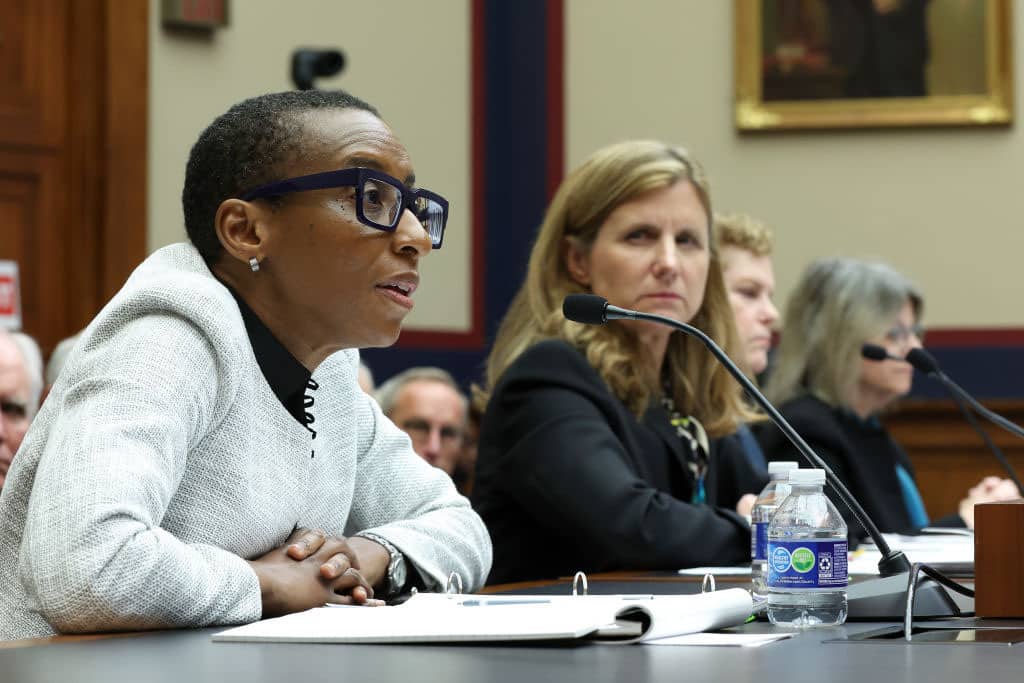 (L-R) Dr. Claudine Gay, President of Harvard University, Liz Magill, President of University of Pennsylvania, Dr. Pamela Nadell, Professor of History and Jewish Studies at American University, and Dr. Sally Kornbluth, President of Massachusetts Institute of Technology (Photo by Kevin Dietsch/Getty Images)
(L-R) Dr. Claudine Gay, President of Harvard University, Liz Magill, President of University of Pennsylvania, Dr. Pamela Nadell, Professor of History and Jewish Studies at American University, and Dr. Sally Kornbluth, President of Massachusetts Institute of Technology (Photo by Kevin Dietsch/Getty Images) Not a day goes by without someone pointing out how fortunate I am to have stepped away from serving as a college president more than a year ago.
I wholeheartedly agree. While there were challenging times during my 22 years as a president, none of them approached today’s no-win nightmare, especially for a president who happens to be, as I am, a proud and vocal Jew.
As I watched the infuriating Congressional testimony that helped cost the presidents of the University of Pennsylvania and Harvard their jobs, while leaving the president of MIT on the hot seat, I was struck by how politicians whose records show zero concern for the safety of Jews on and off campus all of a sudden pretended to be defenders of the Jewish people. More likely, their intention was to boost their political prospects with gotcha soundbites, which the poorly prepared administrators delivered on a silver platter. My friends are certain that I would have handled the situation better. I hope they are correct. I have testified before Congress in the past and it can be extremely intimidating, even when some questions have easy answers.
What I am sure of is that it is all too convenient to blame college presidents for the ills of the world. Psychologists write about negative transference, where hostile feelings are projected onto a person or a group they may barely know. Non-Jews have been doing that to Jews for millennia. And when that happens, how quickly the narrative can turn. Only 15 months ago, a story in Boston’s Jewish paper praised the newly appointed Jewish president of MIT, Sally Kornbluth, as “a brilliant administrator, a creative problem-solver, and a leading advocate of academic excellence,” while applauding her outreach to the Jewish community when she served as Duke’s Provost. She built that reputation over decades, and I find it hard to believe that she has morphed into someone so different a year later, despite her disastrous testimony in front of Congress and the world.
The truth is that it is a tremendous challenge for presidents to lead their institutions, with their massive budgets, complicated missions, and competing stakeholders. They were simpler times when the late Clark Kerr, then head of the University of California, quipped that the secret to a successful presidency is to make sure that the alumni get good football, the undergraduates get good sex, and the faculty get good parking.
Today, presidents are somehow expected to fix everything. Protestors outside the president’s residence at Northwestern would wake my family with chants for me to defund the police, eliminate the use of fossil fuels, redistribute wealth, and much more. I suppose I should have been flattered that they thought I was so powerful. While the tenured faculty knew better about the limits of my authority, that didn’t stop some of them from condemning me for wanting to hold accountable those who expressed their outrage through violence and intimidation. Accountability in higher education! For that group of faculty, it was a bridge too far.
And of course, knowing that I am a practicing Jew with a deep commitment to Israel, the situation in the Middle East was often on the minds of the protestors. They would stand in front of my house in the middle of the night, screaming “From the river to the sea, Palestine will be free.” I guess if I can reverse climate change, I can resolve the Arab-Israeli conflict to everyone’s satisfaction as well.
Consult with your most trusted advisors, but at the end of the day, do what you know is right, not what is expedient.
So how does one exhibit moral leadership during times of peril? Consult with your most trusted advisors, but at the end of the day, do what you know is right, not what is expedient. Draw on a lifetime of experience, and remember that mentors, family, and friends are all watching. You are in your position because people believed in your humanity and integrity. Prove to them that their faith is justified.
If it goes south, know that you can leave with your head held high. And should anyone ask you when a call for the genocide of the Jewish people might be considered part of acceptable discourse, tell them in the strongest possible terms: NEVER.
Morton Schapiro is the former president of Williams College and Northwestern University. His most recent book (with Gary Saul Morson) is “Minds Wide Shut: How the New Fundamentalisms Divide Us.”






















 More news and opinions than at a Shabbat dinner, right in your inbox.
More news and opinions than at a Shabbat dinner, right in your inbox.